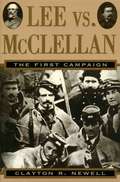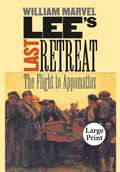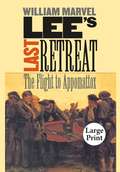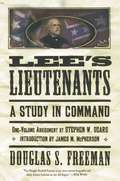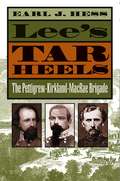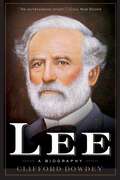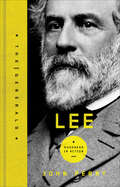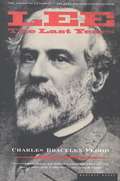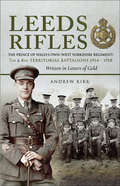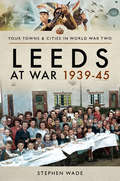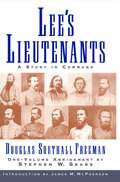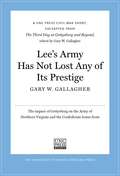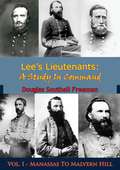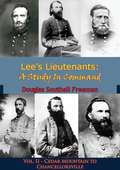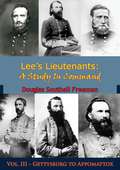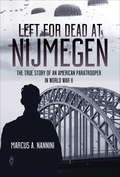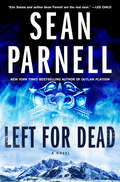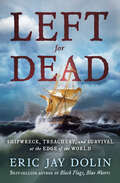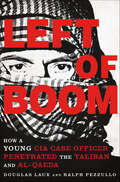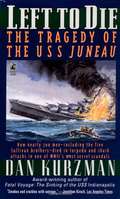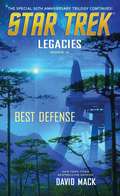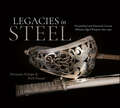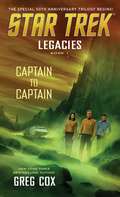- Table View
- List View
Lee vs. McClellan: The First Campaign
by Clayton R. NewellIn 1861, two brilliant but inexperienced generals faced off in the rugged mountains of western Virginia. Neither Robert E. Lee nor George B. McClellan had ever commanded an army before; but in the crucial first campaign of the bloody Civil War, both men were quickly put to the test. Lee vs. McClellan is a vivid, gripping account of this often-overlooked first campaign--a campaign that taught both North and South the grueling realities of war.
Lee's Last Retreat: The Flight to Appomattox
by William MarvelFew events in Civil War history have generated such deliberate mythmaking as the retreat that ended at Appomattox. William Marvel offers the first history of the Appomattox campaign written primarily from contemporary source material, with a skeptical eye toward memoirs published well after the events they purport to describe. Marvel shows that during the final week of the war in Virginia, Lee's troops were more numerous yet far less faithful to their cause than has been suggested. He also proves accounts of the congenial intermingling of the armies at Appomattox to be shamelessly overblown and the renowned exchange of salutes to be apocryphal.
Lee's Lieutenants Third Volume Abridged: A Study in Command
by Douglas Southall FreemanLee's Lieutenants: A Study in Command is the most colorful and popular of Douglas Southall Freeman's works. A sweeping narrative that presents a multiple biography against the flame-shot background of the American Civil War, it is the story of the great figures of the Army of Northern Virginia who fought under Robert E. Lee.The Confederacy won resounding victories throughout the war, but seldom easily or without tremendous casualties. Death was always on the heels of fame, but the men who commanded -- among them Jackson, Longstreet, and Ewell -- developed as leaders and men. Lee's Lieutenants follows these men to the costly battle at Gettysburg, through the deepening twilight of the South's declining military might, and finally to the collapse of Lee's command and his formal surrender in 1865. To his unparalleled descriptions of men and operations, Dr. Freeman adds an insightful analysis of the lessons learned and their bearing upon the future military development of the nation. Accessible at last in a one-volume edition abridged by noted Civil War historian Stephen W. Sears, Lee's Lieutenants is essential reading for all Civil War buffs, students of war, and admirers of the historian's art as practiced at its very highest level.
Lee's Lieutenants: A Study in Command (Lee's Lieutenants: A Study In Command Ser. #3)
by Douglas Southall FreemanLee's Lieutenants: A Study in Command is the most colorful and popular of Douglas Southall Freeman's works. A sweeping narrative that presents a multiple biography against the flame-shot background of the American Civil War, it is the story of the great figures of the Army of Northern Virginia who fought under Robert E. Lee.The Confederacy won resounding victories throughout the war, but seldom easily or without tremendous casualties. Death was always on the heels of fame, but the men who commanded—among them Jackson, Longstreet, and Ewell—developed as leaders and men. Lee's Lieutenants follows these men to the costly battle at Gettysburg, through the deepening twilight of the South's declining military might, and finally to the collapse of Lee's command and his formal surrender in 1865. To his unparalleled descriptions of men and operations, Dr. Freeman adds an insightful analysis of the lessons learned and their bearing upon the future military development of the nation. Accessible at last in a one-volume edition abridged by noted Civil War historian Stephen W. Sears, Lee's Lieutenants is essential reading for all Civil War buffs, students of war, and admirers of the historian's art as practiced at its very highest level.
Lee's Tar Heels
by Earl J. HessThe Pettigrew-Kirkland-MacRae Brigade was one of North Carolina's best-known and most successful units during the Civil War. Formed in 1862, the brigade spent nearly a year protecting supply lines before being thrust into its first major combat at Gettysburg. There, James Johnston Pettigrew's men pushed back the Union's famed Iron Brigade in vicious fighting on July 1 and played a key role in Pickett's Charge on July 3, in the process earning a reputation as one of the hardest-fighting units in Robert E. Lee's Army of Northern Virginia. Despite suffering heavy losses during the Gettysburg campaign, the brigade went on to prove its valor in a host of other engagements. It marched with Lee to Appomattox and was among the last Confederate units to lay down arms in the surrender ceremony.Earl Hess tells the story of the men of the Pettigrew-Kirkland-MacRae Brigade, and especially the famous 26th North Carolina, chronicling the brigade's formation and growth under Pettigrew and its subsequent exploits under William W. Kirkland and William MacRae. Beyond recounting the brigade's military engagements, Hess draws on letters, diaries, memoirs, and service records to explore the camp life, medical care, social backgrounds, and political attitudes of these gallant Tar Heels. He also addresses the continuing debate between North Carolinians and Virginians over the failure of Pickett's Charge.
Lee: A Biography
by Clifford DowdeyGeneral Robert E. Lee is well known as a major figure in the Civil War. However, by removing Lee from the delimiting frame of the Civil War and placing him in the context of the Republic's total history, Dowdey shows the "eternal relevance" of this tragic figure to the American heritage. With access to hundreds of personal letters, Dowdey brings fresh insights into Lee's background and personal relationships and examines the factors which made Lee that rare specimen, "a complete person. ” In tracing Lee's reluctant involvement in the sectional conflict, Dowdey shows that he was essentially a peacemaker, very advanced in his disbelief in war as a resolution. Lee had never led troops in combat until suddenly given command of a demoralized, hodgepodge force under siege from McClellan in front of Richmond. In a detailed study of Lee's growth in the mastery of the techniques of war, he shows his early mistakes, the nature of his seemingly intuitive powers, the limitations imposed by his personal character and physical decline, and the effect of this character on the men with whom he created a legendary army. It was after the fighting was over that Dowdey believes Lee made his most significant and neglected achievement. As a symbol of the defeated people, he rose above all hostilities and, in the wreckage of his own fortunes, advocated rebuilding a New South, for which he set the example with his progressive program in education. The essence of Lee's tragedy was the futility of his efforts toward the harmonious restoration of the Republic with the dissensions of the past forgotten. Skyhorse Publishing, as well as our Arcade imprint, are proud to publish a broad range of books for readers interested in history--books about World War II, the Third Reich, Hitler and his henchmen, the JFK assassination, conspiracies, the American Civil War, the American Revolution, gladiators, Vikings, ancient Rome, medieval times, the old West, and much more. While not every title we publish becomes a New York Times bestseller or a national bestseller, we are committed to books on subjects that are sometimes overlooked and to authors whose work might not otherwise find a home.
Lee: Goodness in Action (The Generals Series)
by John PerryA biography of the often misunderstood, yet heroic, Confederate general who sacrificed everything for his native state of Virginia during the Civil War. Traitor. Divider. Defender of slavery. This damning portrayal of Robert E. Lee has persisted through 150 years of history books. And yet it has no basis in fact.In the spirit of bold restoration, Lee: A Life of Virtue reveals the true Lee—passionate patriot, caring son, devoted husband, doting father, don’t-tread-on-me Virginian, Godfearing Christian.Weaving forgotten facts and revelations (Lee considered slavery a moral outrage) with striking personal details (for years he carried his weakened mother to and from her carriage), biographer John Perry crafts a compelling treatment of the virtuous warrior who endured withering opposition and sacrificed all to stand for Constitutional freedoms.
Lee: The Last Years
by Charles Bracelen FloodA New York Times bestselling author&’s revealing account of General Robert E. Lee&’s life after Appomattox: &“An American classic" (Atlanta Journal-Constitution). After his surrender at Appomattox in 1865, Robert E. Lee, commanding general for the Confederate Army of Northern Virginia during the Civil War, lived only five more years. It was the great forgotten chapter of his remarkable life, during which Lee did more to bridge the divide between the North and the South than any other American. The South may have lost, but Lee taught them how to triumph in peace, and showed the entire country how to heal the wounds of war. Based on previously unseen documents, letters, family papers and exhaustive research into Lee&’s complex private life and public crusades, this is a portrait of a true icon of Reconstruction and quiet rebellion. From Lee&’s urging of Rebel soldiers to restore their citizenship, to his taking communion with a freedman, to his bold dance with a Yankee belle at a Southern ball, to his outspoken regret of his soldierly past, to withstanding charges of treason, Lee embodied his adage: &“True patriotism sometimes requires of men to act exactly contrary, at one period, to that which it does at another.&” Lee: The Last Years sheds a vital new light on war, politics, hero-worship, human rights, and Robert E. Lee&’s &“desire to do right.&”
Leeds Rifles: The Prince of Wales's Own (West Yorkshire Regiment) 7th and 8th Territorial Battalions 1914–1918: Written in Letters of Gold
by Andrew J. KirkThe first detailed chronicle, with photos included, of the four battalions of riflemen who left Leeds for the Western Front. The full wartime story of the &“Leeds Pals&” has never been told. This volume describes their volunteer origins and how they came to be woven into the social fabric of Leeds from where they drew their enduring esprit de corps, discipline, and resolve. It takes the reader on a journey across the Western Front of the Great War, contrasting the first line battalion&’s lot, to stand in the mud of Ypres and endure all without breaking, with the second line battalion&’s blooding at Bullecourt and transformation as part of an elite assault division that went on to occupy Germany. It is told, in part, by those who were there and experienced the fear, elation, and sadness of loss, and who took strength from their volunteer ethos and their common origins in Leeds. All the Leeds Rifles&’ main battles are described in detail as are the helter-skelter actions of the last one hundred days of mobile warfare and escalating casualties, when the defeated but still defiant German army found itself in full and final retreat. Follow the fortunes of these enfants de Yorkshire, these Leeds Lads, as they speak out from the pages of history with a very familiar accent.
Leeds at War, 1939–45 (Your Towns & Cities in World War Two)
by Stephen WadeLeeds at War 1939-1945 is a comprehensive account of the city's experience of the war, covering in expert detail life on the Home Front set against the background of the wider theaters of war.The narrative of that global conflict is given with a focus on the trials and ordeals that faced the people of Leeds as they cheered their men and women fighters off to war, were bombed and saw their children evacuated to rural areas.Rare insights into the life of war-torn Leeds are included, along with untold stories from the footnotes of that history, from the air-raid shelters to the internment issues. The book incorporates the unique human record of that struggle from memoirs and memories, so that the reader sees the war bottom up from the ordinary people, although the military experiences of Leeds' citizens are not ignored.More controversial topics are also touched upon, such as anti-Semitism, labor troubles and crime, to give a full and fascinating picture of a great city facing profound trials of endurance, courage, and that true Yorkshire grit that has been the hallmark of the city's rise to prominence in Britain.
Lees Lieutenants 3 Volume Abridged
by Stephen W. Sears Douglas Southall FreemanA towering landmark in Civil War literature, long considered one of the great masterpieces of military history -- now available in a one-volume abridgment. Lee's Lieutenants: A Study in Command is the most colorful and popular of Douglas Southall Freeman's works. A sweeping narrative that presents a multiple biography against the flame-shot background of the American Civil War, it is the story of the great figures of the Army of Northern Virginia who fought under Robert E. Lee. Dr. Freeman describes the early rise and fall of General Beauregard, the developing friction between Jefferson Davis and Joseph E. Johnston, the emergence and failure of a number of military charlatans, and the triumphs of unlikely men at crucial times. He also describes the rise of the legendary "Stonewall" Jackson and traces his progress in the Shenandoah Valley Campaign and into Richmond amid the acclaim of the South. The Confederacy won resounding victories throughout the war, but seldom easily or without tremendous casualties. Death was always on the heels of fame, but the men who survived -- among them Jackson, Longstreet, and Ewell -- developed as commanders and men. Lee's Lieutenants follows these men to the costly battle at Gettysburg, through the deepening twilight of the South's declining military might, and finally to the collapse of Lee's command and his formal surrender in 1865. To his unparalleled descriptions of men and operations, Dr. Freeman adds an insightful analysis of the lessons learned and their bearing upon the future military development of the nation. Accessible at last in a one-volume edition abridged by noted Civil War historian Stephen W. Sears, Lee's Lieutenants is essential reading for all Civil War buffs, students of war, and admirers of the historian's art as practiced at its very highest level.
Lee’s Army Has Not Lost Any of Its Prestige
by Gary W. GallagherIn this Civil War Short, Gary W. Gallagher surveys Confederate sentiment in the summer of 1863 and argues that many southerners did not view the battle of Gettysburg as a resounding defeat. Gallagher makes the compelling case that, although southern casualties were tremendous, Confederates across the South, along with the vast majority of Lee's soldiers, persisted in viewing Robert E. Lee as an invincible commander whose army increasingly sustained the hopes of the nation. The work was originally published in The Third Day at Gettysburg and Beyond, edited by Gary W. Gallagher, which combines fresh evidence with the reinterpretation of standard sources to testify to the enduring impact of the Civil War on our national consciousness and refocus our view of the third day at Gettysburg. UNC Press Civil War Shorts excerpt rousing narratives from distinguished books published by the University of North Carolina Press on the military, political, social, and cultural history of the Civil War era. Produced exclusively in ebook format, they focus on pivotal moments and figures and are intended to provide a concise introduction, stir the imagination, and encourage further exploration of the topic. For in-depth analysis, contextualization, and perspective, we invite readers to consider the original publications from which these works are drawn.
Lee’s Lieutenants: Vol. I - Manassas To Malvern Hill (Lee’s Lieutenants: A Study In Command #1)
by Douglas Southall FreemanFollowing the critical success of R. E. Lee: A Biography, for which he won the 1935 Pulitzer Prize, author Douglas Southall Freeman expanded his study of the Confederacy with the critically acclaimed three-volume Lee's Lieutenants: A Study in Command, originally published in 1942, 1943, and 1944.Together, the three volumes present a unique combination of military strategy, biography, and Civil War history, and shows how armies actually work. Published during World War II, it had a great influence on American military leaders and strategists.Lee's Lieutenants: A Study in Command established Freeman as the pre-eminent military historian in the country, and led to close friendships with United States generals George Marshall and Dwight D. Eisenhower.
Lee’s Lieutenants: Vol. II - Cedar Mountain to Chancellorsville (Lee’s Lieutenants: A Study In Command #2)
by Douglas Southall FreemanFollowing the critical success of R. E. Lee: A Biography, for which he won the 1935 Pulitzer Prize, author Douglas Southall Freeman expanded his study of the Confederacy with the critically acclaimed three-volume Lee's Lieutenants: A Study in Command, originally published in 1942, 1943, and 1944.Together, the three volumes present a unique combination of military strategy, biography, and Civil War history, and shows how armies actually work. Published during World War II, it had a great influence on American military leaders and strategists.Lee's Lieutenants: A Study in Command established Freeman as the pre-eminent military historian in the country, and led to close friendships with United States generals George Marshall and Dwight D. Eisenhower.
Lee’s Lieutenants: Vol. III - Gettysburg to Appomattox (Lee’s Lieutenants: A Study In Command #3)
by Douglas Southall FreemanFollowing the critical success of R. E. Lee: A Biography, for which he won the 1935 Pulitzer Prize, author Douglas Southall Freeman expanded his study of the Confederacy with the critically acclaimed three-volume Lee's Lieutenants: A Study in Command, originally published in 1942, 1943, and 1944.Together, the three volumes present a unique combination of military strategy, biography, and Civil War history, and shows how armies actually work. Published during World War II, it had a great influence on American military leaders and strategists.Lee's Lieutenants: A Study in Command established Freeman as the pre-eminent military historian in the country, and led to close friendships with United States generals George Marshall and Dwight D. Eisenhower.
Left for Dead
by Jon Hovde Maureen AndersonA book written by a Vietnam Veteran describing his war experiences, the loss of his arm and leg, his struggles because of those injuries, and the aftermath of his war experiences and subsequent injuries.
Left for Dead at Nijmegen: The True Story of an American Paratrooper in World War II (Casemate Illustrated)
by Marcus A. NanniniLeft for Dead at Nijmegen recalls the larger-than-life experiences of an American paratrooper, Gene Metcalfe, who served in the 82nd Airborne during WWII. From his recruitment into the military at Camp Grant to his training with the 501st Paratroop Infantry Regiment at Camp Toccoa, it wasn't until D-Day itself that he first arrived in England to join the 508th PIR. When Metcalfe boarded the C-47 which would drop him at Groesbeek Heights, just outside of Nijmegen, Holland, he was handed a box of twelve dozen condoms by an over-confident British lieutenant. He was to be among the first to jump into what should have been a picture-book meadow, free of German troops. Instead, it was defended by three German anti-aircraft cannon emplacements. As he jumped into a hail of bullets and exploding shells he watched his plane roll over and plummet into the ground. It was at that moment he realized the condoms had either been a bad joke or the planners of Operation Market Garden had seriously underestimated German resistance. Gene was listed as KIA and left for dead by his patrol, who presumed the worst when they saw his injuries from a shell explosion. The rest of his story is equally gripping, as he became a POW held outside Munich, being moved between various camps ridden with disease and a severely undernourished population. Eventually, after making an escape attempt and being captured within sight of the snow-capped Swiss mountains, his camp was liberated by American troops in April 1945. Gene's story is both remarkable for his highly unusual encounter, and his subsequent experiences.
Left for Dead: A Novel
by Sean ParnellSpecial Operative Eric Steele battles a renegade group of bioterrorists armed with a devastating virus in the fourth pulse-pounding military thriller from the New York Times bestselling author of Outlaw Platoon. On a remote mountaintop in western China, Doctor Ai Liang is about to risk everything and defy the Chinese Communist Party. She and her team have created a terrifying new coronavirus, even more deadly than COVID-19, called C-62 that is capable of killing a person in twenty minutes. But her conscience tells her she must destroy the deadly bioweapon before it can bring devastation to millions. The doctor’s heroic plans are interrupted when mysterious commandos swarm the lab, kill everyone in sight, and take off with the C-62 virus.Meanwhile, Eric Steele is on a cleanup mission, about to exact revenge on the group responsible for killing numerous alphas and forcing the Program to disband. When justice is served, Steele can turn his thoughts to other pressing matters—namely his long lost father and his estranged girlfriend, Meg Harden.But when news of CCP plans to attack US forces reach the United States, the President calls for the revival of the Program to deal with this new threat. Steele is back in action, and soon learns that the supposed CCP attack is related to a much more complex plot involving a fanatical Chinese Imperialist group—and the stolen C-62 bioweapon. It’s up to Steele and his team to find out who the real threat is and stop them before they can unleash another pandemic in the form of the deadly C-62 virus on the entire world.
Left for Dead: Shipwreck, Treachery, and Survival at the Edge of the World
by Eric Jay DolinThe true story of five castaways abandoned on the Falkland Islands during the War of 1812—a tale of treachery, shipwreck, isolation, and the desperate struggle for survival. In Left for Dead, Eric Jay Dolin—“one of today’s finest writers about ships and the sea” (American Heritage)—tells the true story of a wild and fateful encounter between an American sealing vessel, a shipwrecked British brig, and a British warship in the Falkland archipelago during the War of 1812. Fraught with misunderstandings and mistrust, the incident left three British sailors and two Americans, including the captain of the sealer, Charles H. Barnard, abandoned in the barren, windswept, and inhospitable Falklands for a year and a half. With deft narrative skill and unequaled knowledge of the very pith of the seafaring life, Dolin describes in vivid and harrowing detail the increasingly desperate existence of the castaways during their eighteen-month ordeal—an all-too-common fate in the Great Age of Sail. A tale of intriguing complexity, with surprising twists and turns throughout—involving greed, lying, bullying, a hostile takeover, stellar leadership, ingenuity, severe privation, endurance, banishment, the great value of a dog, the birth of a baby, a perilous thousand-mile open-ocean journey in a seventeen-foot boat, an improbable rescue mission, and legal battles over a dubious and disgraceful wartime prize—Left for Dead shows individuals in wartime under great duress acting both nobly and atrociously, and offers a unique perspective on a pivotal era in American maritime history.
Left of Boom: How a Young CIA Case Officer Penetrated the Taliban and Al-Qaeda
by Ralph Pezzullo Douglas LauxLeft of Boom is the explosive New York Times bestselling memoir by a young CIA operative on the front lines in Afghanistan.On September 11, 2001, Douglas Laux was a freshman in college, on the path to becoming a doctor. But with the fall of the Twin Towers came a turning point in his life. After graduating he joined the Central Intelligence Agency, determined to get himself to Afghanistan and into the center of the action. Through persistence and hard work he was fast-tracked to a clandestine operations position overseas. Dropped into a remote region of Afghanistan, he received his baptism by fire. Frustrated by bureaucratic red tape, a widespread lack of knowledge of the local customs and culture and an attitude of complacency that hindered his ability to combat the local Taliban, Doug confounded his peers by dressing like a native and mastering the local dialect, making contact and building sources within several deadly terrorist networks. His new approach resulted in unprecedented successes, including uncovering the largest IED network in the world, responsible for killing hundreds of US soldiers. Meanwhile, Doug had to keep up false pretenses with his family, girlfriend and friends--nobody could know what he did for a living--and deal with the emotional turbulence of constantly living a lie. His double life was building to an explosive resolution, with repercussions that would have far reaching consequences.
Left to Die: The Story of the USS Juneau
by Dan KurzmanThe award-winning author of "Fatal Voyage: The Sinking of the U. S. S. Indianapolis", brings us a compelling account of the calamity that befell the sailors aboard the "U. S. S. Juneau"--and blows open the lid on the betrayals and miscalculations surrounding one of the worst disasters in U. S. Navy history.
Legacies #2: Best Defense (Star Trek: The Original Series)
by David MackJust in time for the milestone 50th Anniversary of Star Trek: The Original Series, an epic new trilogy that stretches from the earliest voyages of the Starship Enterprise to Captain Kirk’s historic five-year-mission—and from one universe to another!A debt of honor: One brave woman ventures alone into a parallel universe to save her old shipmates, exiled there decades earlier by a mysterious device called the Transfer Key. She soon learns the alternate universe harbors not just an alien invasion force, but a secret that underpins its very existence. A mission of peace: A long-awaited Klingon-Federation peace conference convenes, led by Ambassador Sarek of Vulcan and Councillor Gorkon of Qo&’noS. But both sides have enemies who would prefer the two great powers remain at war—and who will do anything to make certain hate wins the day. An errand of justice: Captain Kirk and his crew seek the stolen Transfer Key that opens a door between universes, but their hunt is cut short by Ambassador Sarek&’s plea for help. The Enterprise crew soon becomes targets in a deadly crossfire—one whose outcome will decide the fate of two universes.
Legacies in Steel: Personalized and Historical German Military Edged Weapons, 1800–1990 (Latin America at War)
by Hermann Hampe Rick DauzatNearly 100 German military edged weapons are presented in this sumptuously photographed volume featuring information about their owners. Spanning nearly two hundred years, Legacies in Steel is an in-depth photographic study of historical edged weapons from the German military. The elegant details of each selection are displayed in close-up detail. Many of these weapons belonged to nobility, aristocrats, high-ranking military personnel as well as soldiers and seamen. Where possible, the careers and exploits of these former owners are highlighted, bringing both personal and historical context to these beautifully crafted artifacts. By the 19th century, swords and daggers were no longer effective fighting weapons, but they maintained their popularity in Western Europe as uniform regalia. They were carried as a symbol of authority, achievement, and most importantly, honor. These weapons were produced with great skill and at high cost, requiring the skill of specialized artisans, often using precious metals and ivory, elaborate hand engraving and chiseling. Blades were fabricated of the highest quality Solingen steel. Folded steel Damascus blades were also painstakingly produced. Many examples are unique and border on singular works of art.
Legacies: Captain To Captain (Star Trek: The Original Series)
by Greg CoxAn epic new trilogy begins—a tie-in for the milestone fiftieth anniversary of Star Trek: The Original Series—that stretches from the earliest voyages of the Starship Enterprise to Captain Kirk’s historic five-year-mission…and from one universe to another!Hidden aboard the U.S.S. Enterprise is a secret that has been passed from captain to captain, from Robert April to Christopher Pike to James T. Kirk. Now the return of the enigmatic woman once known as Number One has brought that secret to light, and Kirk and his crew must risk everything to finish a mission that began with April so many years ago… Nearly two decades earlier, April and his crew first visited the planet Usilde, where they found both tragedy and a thorny moral dilemma. Today, the legacy of that fateful occasion will compel Kirk to embark on a risky voyage back to that forbidden world—which is now deep in territory claimed by the Klingon Empire! ™, ®, & © 2016 CBS Studios, Inc. STAR TREK and related marks and logos are trademarks of CBS Studios, Inc. All Rights Reserved.
